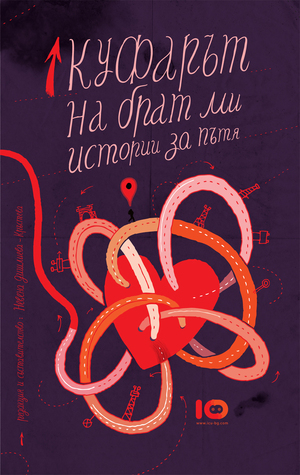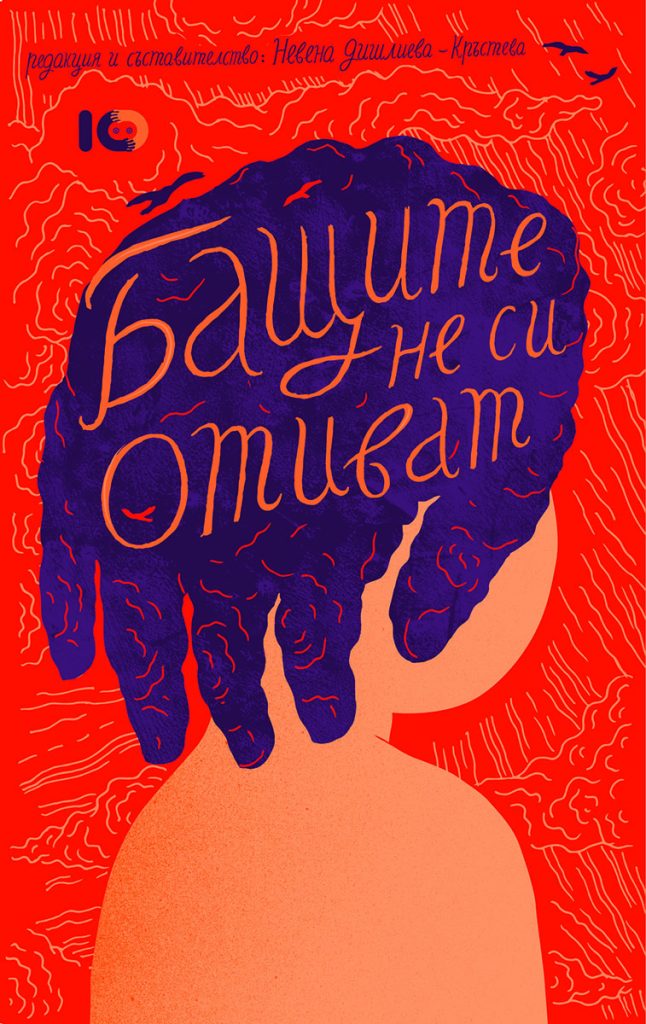ВЪЗМОЖНОСТИ ЗА УЧАСТИЕ В ТРЕНИНГОВИ ПРОГРАМИ И ИНИЦИАТИВИ,…
ANIDOX:LAB 2023 ANIDOX:LAB е персонализиран професионален курс за творци, режисьори, продуценти…
We continue with the series dedicated to Bulgarian publishers actively participating and successful in the rounds of the Programme. Following our first interview with Milen Milev of Paradox Publishing, we meet Nevena Dishlieva-Krasteva – the “driving force” at the small family publishing house ICU to learn more about their publishing strategy and the experience gained with “Creative Europe”.
We are fine, thank you. I hope everyone will keep their sanity and try to protect themselves and their loved ones. Our work is mainly done online as most bookstores are closed and major bookstore chains stopped paying – even the debts accumulated before the state of emergency was declared. This forces the smallest ones, like us, to rearrange their schedule. We revitalised online sales, accelerated the process of upgrading the website, which was already planned as part of our activities, just now we have had to speed up. We have also accelerated the completion of our e-books – again with this in mind. There are still some obscurities about upcoming events, authors’ visits and activities, participation in fairs and exhibitions, but at the moment, we try to take care of short-term plans and not despair.

Over the years, I’ve sifted through literary agencies, personal contacts, and catalogues that I follow. I go to at least one of the major book fairs – London or Frankfurt usually; I follow major global platforms such as Goodreads, professional publications such as The Bookseller, Kirkus Review, Guardian’s literary pages, NY Times Literary Supplement, the sites of several bookstores such as Waterstones, Barnes and Noble. I also follow authors that I am fond of and listen to the recommendations of writers, translators, readers, etc.
The most important thing for me is that there is a connection between the books, that each of them be part of the spirit of ICU Publishing, that the topics be multiplying and going deeper. Some of our authors are holders of the most prestigious awards in the literary world, such as the Nobel Prize in Literature of Olga Tokarczuk, but there are still emerging authors with compelling talent and depth, such as Goran Vojnović. The formal side of the awards is not important to me, I care most about meaning and literature.
All the time. ICU is a publishing house for valuable non-mainstream fiction. The topics I’m interested in as a publisher are not always attractive and popular, they are related to deep human trauma, difficult family relationships, migration, path and home – all things that make the readers bury themselves deep in their inner world. All this in the “package” of uncompromising literature. The mass reader – generally – likes it easy and fun.
“Craving” is part of our ongoing project, co-financed under the Creative Europe Programme and called “Books that make a difference”. The novel is included in “On the Road”, our publishing house’s collection with valuable literary works from all over Europe. Our ambition is to draw a literary map which the reader can use and get an idea of trends, authors, writing approaches. So far, the series includes one Finnish, Flemish, Slovenian, Cypriot and Dutch book, with three of the five co-financed under the Creative Europe Programme.

“Craving” is a special novel, very short, constructed as a dramaturgical text, with a lot of dialogue. The plot of the book may be presented in two sentences: a mother and a daughter bump into each other on the street, and it becomes clear that the mother is terminally ill. The daughter decides to move in with her mother, who no longer lives with her father. She announces this decision over dinner with her lover and her father’s new family. After the daughter moves in with the mother, longstanding problems and painful wounds surface. We are gradually witnessing a lack of human emotions in the lives of characters – intimacy, affection, warmth. After all, “Craving” is a novel about broken human and family relationships, distance, the inability to show and accept intimacy.
It is about Katerina Stoykova’s “Second Skin” and the two anthological collections – “My Brother’s Suitcase” and “Fathers Do Not Leave”.

Regarding “Second Skin” – Katerina Stoykova is a bilingual author, living in the United States for more than twenty years, and writes and translates between the two languages. Her book deals with domestic violence in an extremely powerful way – through poetry. The author’s previous poetry book was also published in both languages, but with just our own efforts, without external funding. Because the poetry of Katerina is universal and cannot be confined only to a certain language. The same applies to both collections. Especially “My Brother’s Suitcase”, which is a book containing the migrant stories of 23 people – mostly Bulgarians, but also several foreigners connected with Bulgaria. There is no need to talk about the universality of the loss – it is at the heart of the collection “Fathers Do Not Leave”.
Тhe three books, regardless of their original language, are an organic part of our project because they focus on the power of literature to transform, to leave a mark and to help overcome traumas.


Our entire project includes 10 books. So far, five have been published, five more to go – “Nora Webster” by Colm Tóibín, “An Album of Stories” by European Prize in Literature winner Antonis Georgiou, “Everyone Brave is Forgiven” by Chris Cleave and the two collections mentioned above. Tóibín and Cleave are authors of ICU, we have published two other books by each of them. It is extremely important for us to track our authors’ progress, to present them at the different stages of their creative lives and to provide the reader with as complete a literary picture as possible in that sense. And with this in mind, we greatly appreciate the help of the Creative Europe Programme, which makes it possible to publish and promote these books that are so valuable to us.


Antonis Georgiou is the second Cypriot author in our catalogue, following another European Prize winner, Emilios Solomou. The two books are totally different and, at the same time, complementing each other – dealing with topics such as the footprint of the past on the present, family roots and traditions, feelings of guilt and overcoming them. And so, they are additional branches along the path that we’ve chosen for our project of books that leave a mark.
“If publishers believe in the choices they are making, if their books are valuable and have something to say to future readers, the first part of the job is already done.”
For me, the challenge is not in expressing my concept in English, but the complicated procedure of compiling the project. The same questions are asked differently. Details are required, which in a biennial project are certainly subject to change, for example, the names of media and platforms where books will be presented, specific bookstores and chains. Overall, the work on preparing such a project takes valuable time and requires huge resources – for a family publishing house like ICU, this is a problem because it means stopping all other activities and devoting ourselves only to compiling the project. Of course, we do this because without the support of the Programme, the survival of an independent boutique literary publishing house is even more complicated.
I have noticed that there are some languages that are not priority languages. For example, one of our project evaluations pointed out that there are too many books translated from English. Without taking into consideration that English is used not only in Great Britain, but also in Ireland, Malta and other countries, for example. Regarding genres, the terms of the competition state that children’s literature and narratives are priority genres. On topics – I can’t tell you. In our publishing house, there is a range of topics that we follow and where we place our books. We would not fail the basic principles of our publishing house in order to adapt to a specific project or programme.
Translators occupy a special place at ICU Publishing. For English – with which I myself have been working for years – I have a small contingent of trusted translators who are not only high-level professionals, but also have a similar attitude to the topics and literature that excite me. It is important for me to work with these people, because making books for me is not just a formal act, or simply a profession profession, this is part of who I am. Nadezhda Rozova, Elka Videnova – great people and translators. My contact with translators of other languages more unfamiliar to me, with which we have expanded the range of books published in recent years, is also more than satisfactory and fulfilling. Through the books I met Maria Encheva, Sylvia Borisova, Rositsa Tsvetanova, Lilija Mrzlikar, Irena Aleksieva, and I can tell you a lot about all of them. One of the most valuable aspects of publishing. Apart from translators, working onthe books involves the efforts of proof-readers, editors, designers, desktop publishers, typesetters… each of them is important to me and an integral part of the process.
Support is indisputable and invaluable, and for my boutique publishing house – vital. It is particularly important, in my opinion, that support is in three components – translation, publishing costs and promotion, because a book cannot happen without either of them. A problem is that there are hardly any programmes (with the exception of Traduki, as far as I know) to support the payment of copyright, which is a significant cost item of the budget of publishing a book.
If publishers believe in the choices they are making, if their books are valuable and have something to say to future readers, the first part of the job is already done. All that remains is to collect our thoughts and take the time to share them in the most convincing way possible.